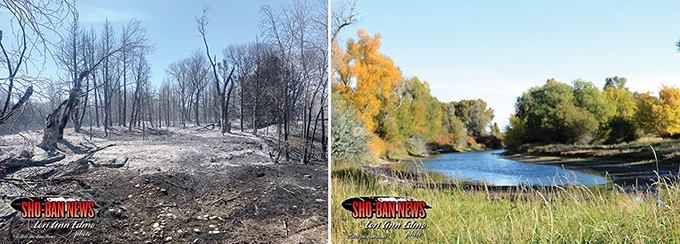Lavaside fire burns critical wildlife habitat

Lavaside Property fire aftermath (left) and Lavaside Property before.
By LORI ANN EDMO
Sho-Ban News
FORT HALL — Critical habitat for wildlife was impacted when the Lavaside fire burned more than 1,190 acres near Firth last week.
The fire burned not only burned private land but also mitigation land the Shoshone-Bannock Tribes owns referred to as the “Lavaside” property purchased in 2013 as part of the Southern Idaho Wildlife Mitigation Program (SIWM). It is 575 acres of riparian and upland habitat along the Snake River that represents one of the largest parcels of cottonwood galley forest in eastern Idaho. It provided forage, nesting and brooding opportunities for grasslands and open water that provides forage, nesting, and brooding opportunities for wildlife.
Among the affected include the Yellow Billed Cuckoo – an Endangered Species Act listed bird that utilizes the cottonwood/willow for nesting grounds. The bird is also found on the Fort Hall Bottoms in cottonwood habitat.
The fire began April 21 starting on private property southwest of Firth on private land. After high winds the fire grew to more than 1,192 acres. It was contained on April 25.
Tribal Fish and Wildlife Director Chad Colter said physically the property hasn’t changed until now. But cottonwood regeneration generally requires flooding and they may not see the regeneration needed. SIWM biologist Aren Eddinsaas said they have to get in the area and evaluate it to help restore the habitat for wildlife and the public. He noted one of the biggest issues they have these days is not having the flooding on the Snake River because dams have to control the flood waters along the Snake River. Human activity is limiting the wildlife populations.
Colter said the habitat fragmentation and loss is because of pollution, hydropower, irrigation, municipalities, industry and private property rights — the limiting factor for many species of wildlife and as the effects of climate change take hold of the Snake River, “We can only pray that cottonwoods and the Snake River Cottonwood corridor can remain intact for future generations.”
According to the management plan for the property the primary goal is to protect, enhance and restore habitat for big game, migratory and upland birds, riverine species and waterfowl.
Both tribal and non-tribal members utilize the area for hunting and the fire will have a huge impact as it is a fairly well used property for archery hunters.





